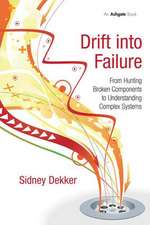Patient Safety: A Human Factors Approach
Autor Sidney Dekkeren Limba Engleză Paperback – 20 mai 2011
People often think, understandably, that safety lies mainly in the hands through which care ultimately flows to the patient—those who are closest to the patient, whose decisions can mean the difference between life and death, between health and morbidity. The human factors approach refuses to lay the responsibility for safety and risk solely at the feet of people at the sharp end. That is where we should intervene to make things safer, to tighten practice, to focus attention, to remind people to be careful, to impose rules and guidelines. The book defines an approach that looks relentlessly for sources of safety and risk everywhere in the system—the designs of devices; the teamwork and coordination between different practitioners; their communication across hierarchical and gender boundaries; the cognitive processes of individuals; the organization that surrounds, constrains, and empowers them; the economic and human resources offered; the technology available; the political landscape; and even the culture of the place.
The breadth of the human factors approach is itself testimony to the realization that there are no easy answers or silver bullets for resolving the issues in patient safety. A user-friendly introduction to the approach, this book takes the complexity of health care seriously and doesn’t over simplify the problem. It demonstrates what the approach does do, that is offer the substance and guidance to consider the issues in all their nuance and complexity.
Preț: 433.56 lei
Nou
Puncte Express: 650
Preț estimativ în valută:
82.98€ • 86.31$ • 69.54£
82.98€ • 86.31$ • 69.54£
Carte tipărită la comandă
Livrare economică 13-27 martie
Preluare comenzi: 021 569.72.76
Specificații
ISBN-13: 9781439852255
ISBN-10: 1439852251
Pagini: 262
Ilustrații: 6 black & white illustrations, 2 black & white tables
Dimensiuni: 156 x 234 x 15 mm
Greutate: 0.39 kg
Ediția:1
Editura: CRC Press
Colecția CRC Press
ISBN-10: 1439852251
Pagini: 262
Ilustrații: 6 black & white illustrations, 2 black & white tables
Dimensiuni: 156 x 234 x 15 mm
Greutate: 0.39 kg
Ediția:1
Editura: CRC Press
Colecția CRC Press
Public țintă
Academic and Professional Practice & DevelopmentCuprins
Medical Competence and Patient Safety, The Problem of "Human Error" in Healthcare. Cognitive Factors of Healthcare Work. New Technology, Automation and Patient Safety. Safety Culture and Organizational Risk. Practical Tools for Creating Safety. Accountability and Learning from Failure. New Frontiers in Patient Safety: Complexity and Systems Thinking.
Notă biografică
About the author: Sidney Dekker (PhD, The Ohio State University, 1996) is Professor and Director of the Key Centre for Ethics, Law, Justice and Governance at Griffith University, Brisbane, Australia. He was previously Professor and Director of the Leonardo da Vinci Center for Complexity and Systems Thinking at Lund University, Sweden, and Professor of Community Health Science at the Faculty of Medicine, University of Manitoba, Canada. He has been Visiting Professor at the Alfred Hospital in Melbourne, Australia. He recently became active as airline pilot, flying the Boeing 737.
Recenzii
"User-friendly and well written, this book takes the complex nature of healthcare seriously and pulls no punches. It demonstrates what the human factors approach can and does do, providing excellent examples to tease out the subtleties of this fascinating subject."
—The RoSPA Occupational Safety & Health Journal, June 2012
—The RoSPA Occupational Safety & Health Journal, June 2012
Descriere
With coverage ranging from the influence of professional identity in medicine and problematic nature of "human error," to the psychological and social features that characterize healthcare work, to the safety-critical aspects of interfaces and automation, this book spans the width of the human factors field and its importance for patient safety today. In addition, the book discusses topics such as accountability, just culture, and secondary victimization in the aftermath of adverse events and takes readers to the leading edge of human factors research today: complexity, systems thinking, and resilience.


















